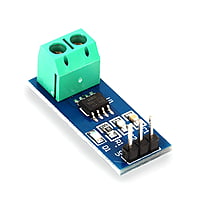




ACS712 Current Sensor 30A
Product Details
Hall Effect Principle: The ACS712 operates on the Hall effect, which means it can measure the magnetic field generated by the current flowing through a conductor.
Current Sensing Range: The ACS712 30A version is designed to measure currents in the range of -30A to +30A. It can handle both positive and negative currents.
Output Signal: It provides an analog output voltage that is proportional to the current being measured. The output voltage is centered at Vcc/2 (typically 2.5V when powered by 5V), and it varies linearly with the current.
Sensitivity: The sensitivity of the ACS712 30A module is typically 66 mV per ampere (mV/A). This means that for every ampere of current passing through the sensor, the output voltage will change by 66 mV.
Built-in Overcurrent Protection: The ACS712 has built-in overcurrent detection, which can be used to detect when the current exceeds a certain threshold.
Power Supply Voltage: It typically operates with a supply voltage of 5V DC.
Zero Current Output: When no current is flowing through the sensor, the output voltage is centered at Vcc/2, which is typically 2.5V.
Pinout: The module typically has three pins: Vcc (power supply), GND (ground), and OUT (analog output).
Applications: ACS712 current sensors are commonly used in various applications, including motor control, power monitoring, battery management, and current measurement in electronic projects.
Accuracy: The accuracy of the ACS712 sensor depends on the specific model and its calibration. It's important to refer to the datasheet or documentation for the specific module you are using to understand its accuracy.


